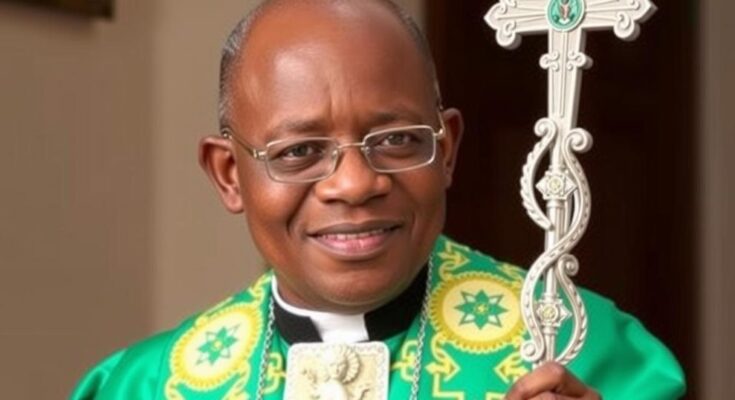Archbishop Samuel Kleda of Douala urges Cameroon’s ageing leaders to resign for new generations to lead, citing poor governance and corruption as contributors to widespread poverty. He highlights President Biya’s 42 years in power as a time for change, urging citizens to vote in the upcoming election to ensure progressive leadership.
Archbishop Samuel Kleda of Douala has called upon the elderly leaders of Cameroon to step down and allow a new generation to lead the nation. In an interview with RTVC, he criticized the prevalent issues of poor governance, electoral fraud, and corruption, underscoring how these factors contribute to the severe poverty faced by many Cameroonians despite the country’s abundant resources. Archbishop Kleda highlighted that leaders, as they age, may lose the necessary physical and cognitive capacities to govern effectively, suggesting that those unable to fulfill their duties should resign to allow for new leadership that can address the needs and aspirations of the youth.
He particularly referenced President Paul Biya, who has ruled for over 42 years and will turn 92 next year, as emblematic of the need for a generational shift in leadership. The archbishop noted that the failure of the current government to create an environment conducive to job creation has led to a troubling exodus of young people seeking better opportunities abroad, thereby weakening the economic structure of the country. He lamented the absence of significant investment in critical infrastructure, stating that the poor state of roads hinders economic progress and increases the cost of goods.
Furthermore, Kleda described the growing economic inequality in Cameroon, where wealth remains concentrated among a few while the majority suffers in poverty. He concluded by encouraging citizens to participate in the upcoming elections, emphasizing that each vote holds the potential for meaningful change in a nation ripe for new leadership.
Cameroon has been under the leadership of President Paul Biya since 1982, making him one of the longest-serving leaders in the world. As his administration approaches its fifth decade, concerns regarding governance, economic management, and the well-being of the Cameroonian populace have intensified. Archbishop Kleda’s remarks reflect a growing sentiment among many citizens and observers who advocate for political change and sustainable development, particularly in light of the challenges posed by aging leadership that struggles to address contemporary issues faced by the youth and society at large.
In conclusion, Archbishop Samuel Kleda’s appeal underscores a significant generational divide in Cameroon’s leadership and the urgent need for reform. His observations about the deteriorating conditions related to governance highlight the importance of accountability and responsiveness in leadership. As the nation prepares for the upcoming presidential election, the archbishop’s call for citizens to engage in the democratic process stands as a pivotal message for those seeking change and progress in Cameroon.
Original Source: cruxnow.com




